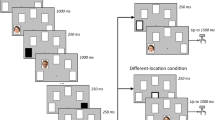Abstract
Eichenbaum and colleagues observed that the same place did or did not activate the “goal-approach” cells in hippocampus depending on whether the place was the way for rats to approach specific goal. Parallel with this, the present neuroimage study revealed that, the same type of items could activate the hippocampus more when it was related to the task at hand than when it not. Participants were scanned by fMRI while they made judgments on the type of relationships contained in the word-pairs (e.g., Does the word pair, “furniture-table”, contain a “category-exemplar” relationship?). Event-related analysis revealed that the forming of “task-related” association activated hippocampus more than that of “task-unrelated”, even if it was the same type of items, and, this hippocampal difference was not caused by the different judgment requirements, nor by the effects of “yes” response. Consistently, the post-judgment cued-recall test exhibited a better retrieval performance for “task-related” associations than for the same type but “task-unrelated” associations. Results also showed that, the semantic relatedness between the to-be-associated individual words (e.g., the related word pair “healthy-hospital” versus the unrelated word pair “price-way”) was not enough to activate the hippocampus when it was “task-unrelated”. Generally, we proposed that, through participating in forming of “task-related” associations and consolidating of episodic memory, hippocampus enabled the organism to keep the information that owned great survival values in mind for future usage.
Similar content being viewed by others
References
Eichenbaum H, Kuperstein M, Fagan A, et al. Cue-sampling and goal-approach correlates of hippocampal unit activity in rats performing an odor-discrimination task. J Neurosci, 1987, 7: 716–732
Wagner A D, Schacter D L, Rotte M, et al. Building memories: remembering and forgetting of verbal experiences as predicted by brain activity. Science, 1998, 281: 1188–1191
Brasted P J. Role of the hippocampal system in associative learning beyond the spatial domain. Brain, 2003, 126: 1202–1223
Prince S E, Daselaar S M, Cabeza R. Neural correlates of relational memory: Successful encoding and retrieval of semantic and perceptual associations. J Neurosci, 2005, 25: 1203
Ross R S, Slotnick S D. The Hippocampus is preferentially associated with memory for spatial context. J Neurosci, 2008, 20: 432–446
Henke K, Weber B, Kneifel S, et al. Human hippocampus associates information in memory. Proc Natl Acad Sci USA, 1999, 96: 5884–5889
Luo J, Niki K. “Role of medial temporal lobe in extensive retrieval of task-related knowledge.” Hippocampus, 2002, 12(4): 487–494
Redish A D. The hippocampal debate: are we asking the right questions? Behav Brain Res, 2001, 127: 81–98
Redish A D, Touretzky D S. Cognitive maps beyond the hippocampus. Hippocampus, 1997, 7: 15–35
Lepage M, Habib R, Cormier H, et al. Neural correlates of semantic associative encoding in episodic memory. Brain Res Cogn Brain Res, 2000, 9: 271–280
Friston K J, Holmes A P, Worsley K J. How many subjects constitute a study? Neuroimage, 1999, 10: 1–5
Wallenstein G V, Eichenbaum H, Hasselmo M E. The hippocampus as an associator of discontiguous events. Trends Neurosci, 1998, 21: 317–323
Brewer J B, Zhao Z, Desmond J E, et al. Making memories: Brain activity that predicts how well visual experience will be remembered. Science, 1998, 281: 1185–1187
Tulving E, Markowitsch H J, Kapur S, et al. Novelty encoding networks in the human brain: Positron emission tomography data. Neuroreport, 1994, 5: 2525–2528
Knight R. Contribution of human hippocampal region to novelty detection. Nature, 1996, 383: 256–259
Tulving E, Markowitsch H J, Craik F E, et al. Novelty and familiarity activations in PET studies of memory encoding and retrieval. Cereb Cortex, 1996, 6: 71–79
Grunwald T, Lehnertz K, Heinze H J, et al. Verbal novelty detection within the human hippocampus proper. Proc Natl Acad Sci USA, 1998, 95: 3193–3197
Gorman A N. Recognition memory for names as a function of abstractness and frequency. J Exp Psychol, 1961, 61: 23–29
Schulman A I, Lovelace E A. Recognition memory for words presented at slow or rapid rate. Psychonomic Science, 1970, 21: 99–100
Moscovitch M. Recovered consciousness: a hypothesis concerning modularity and episodic memory. J Clin Exp Neuropsychol, 1995, 17: 276–290
Squire L R, Zola-Morgan S. The medial temporal lobe memory system. Science, 1991, 253: 1380–1386
Squire L R. Memory and the hippocampus: A synthesis from findings with rats, monkeys, and humans. Psychol Rev, 1992, 99: 195–231
Eichenbaum H, Otto T, Cohen N J. Two functional components of the hippocampal memory system. Behav Brain Sci, 1994, 17: 499–518
Cohen N J, Ryan J, Hunt C, et al. Hippocampal system and declarative (relational) memory: Summarizing the data from functional neuroimaging studies. Hippocampus, 1999, 9: 83–98
McClelland J L, McNaughton B L, O’Reilly R C. Why there are complementary learning systems in the hippocampus and neocortex: Insights from the successes and failures of connectionist models of learning and memory. Psychol Rev, 1995, 102: 419–457
Rolls E T. A theory of hippocampal function in memory. Hippocampus, 1996, 6: 601–620
Author information
Authors and Affiliations
Corresponding author
Additional information
Supported by the National Natural Science Foundation of China (Grant No. 30770708), National High Technology Research and Development Program of China (Grant No. 2006AA02Z431) and Knowledge Innovation Project of the Chinese Academy of Sciences (Grant No. KSCX2-YW-R-28)
About this article
Cite this article
Zhang, X., Niki, K. & Luo, J. Hippocampus’s role in forming “task-related” associations: Flashing to the things you are looking for. Chin. Sci. Bull. 53, 2496–2505 (2008). https://doi.org/10.1007/s11434-008-0321-6
Received:
Accepted:
Published:
Issue Date:
DOI: https://doi.org/10.1007/s11434-008-0321-6




